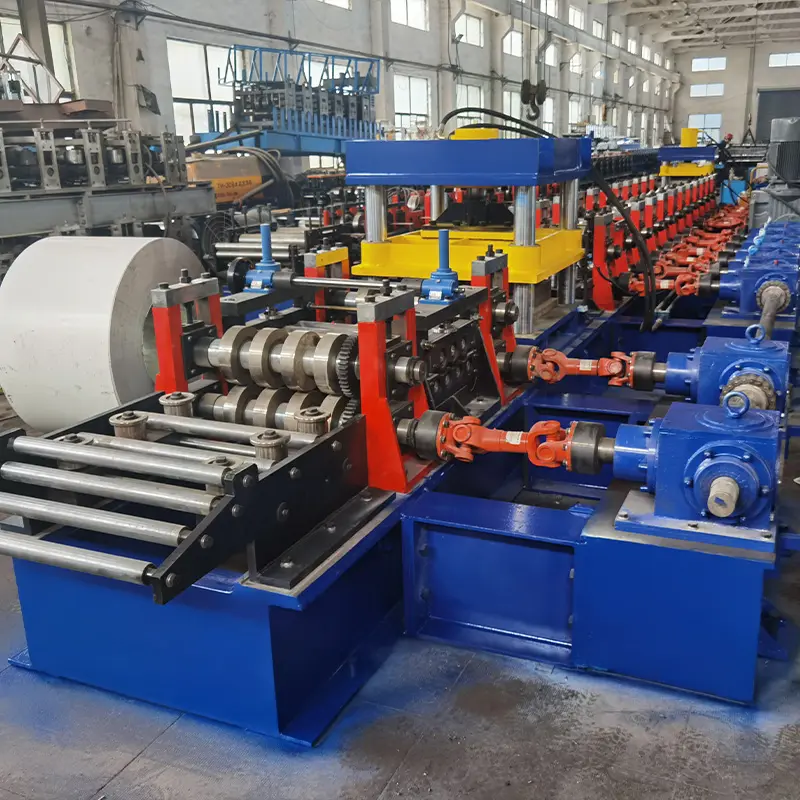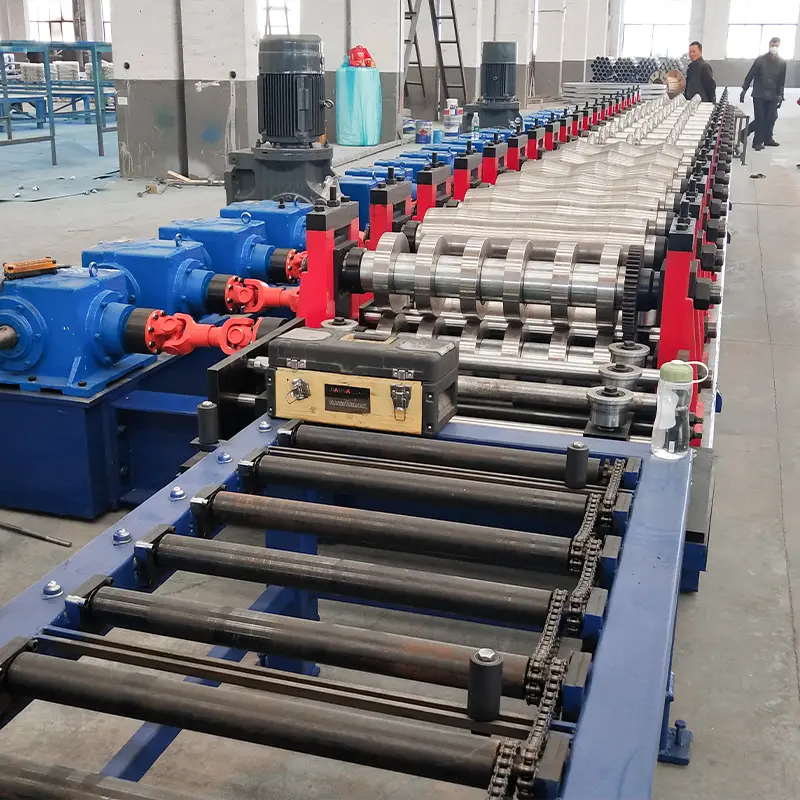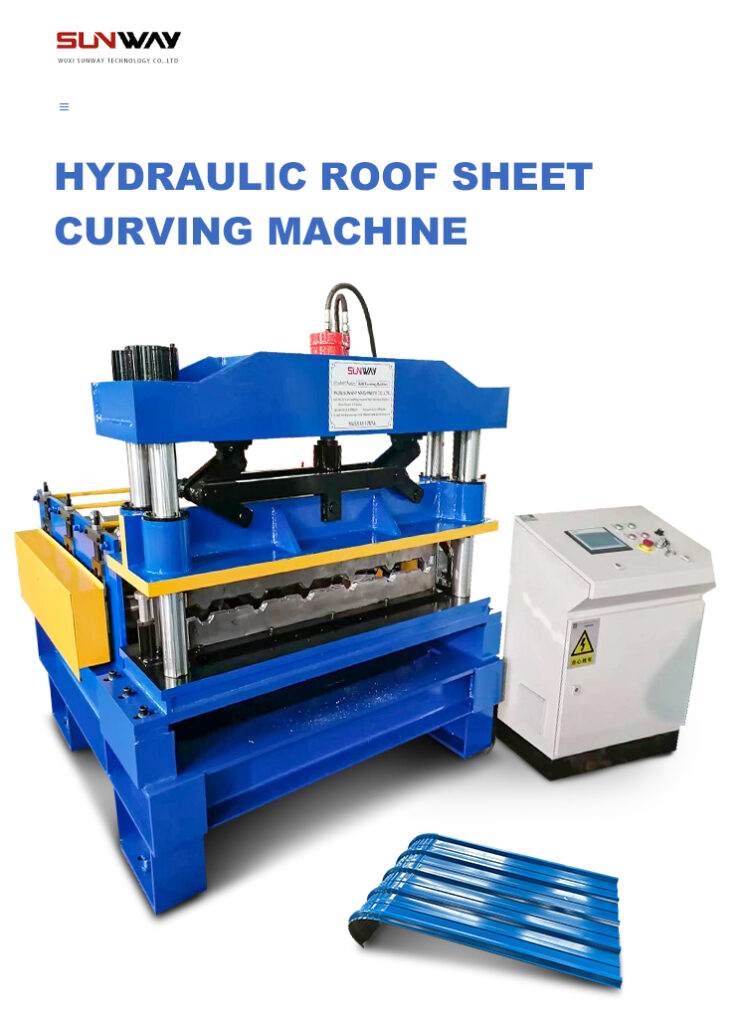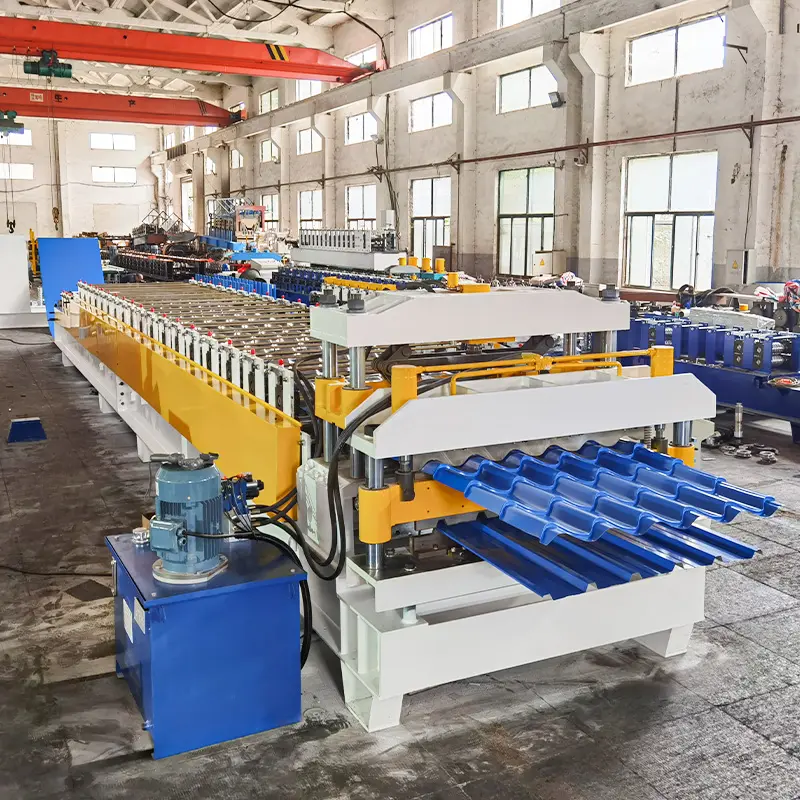परिचय
आधुनिक निर्माण में, दक्षता, सटीकता तथा लागत-प्रभाविता सर्वोपरि हैं। यह छत की दीवार पैनल रोल बनाने की मशीन उपकरण है जिसने रूफिंग तथा वॉल क्लैडिंग तत्वों के विनिर्माण के तरीके को बदल दिया है। इस लेख में, हम रूफ वॉल पैनल रोल फॉर्मिंग मशीन के घटकों, संचालन से लेकर विभिन्न उद्योगों में इसके विविध अनुप्रयोगों तक सब कुछ जानेंगे।
रूफ वॉल पैनल रोल फॉर्मिंग मशीन को समझें
रोल बनाने की मशीन क्या है?
रोल फॉर्मिंग मशीन एक विशेष उपकरण है जो धातु शीटों या कॉइलों को वांछित क्रॉस-सेक्शन प्रोफाइल में आकार देता है। इस प्रक्रिया में सामग्री को एक श्रृंखला के रोलर्स के साथ निरंतर मोड़ा जाता है, जहां प्रत्येक रोलर एक विशिष्ट आकार देने का कार्य करता है।
रूफ वॉल पैनल रोल फॉर्मिंग मशीन: एक अवलोकन
रूफ वॉल पैनल रोल फॉर्मिंग मशीन विशेष रूप से रूफ पैनलों तथा वॉल क्लैडिंग शीटों का सटीक तथा एकसमान उत्पादन करने के लिए डिजाइन की गई है। यह स्टील, एल्यूमीनियम तथा तांबा सहित विभिन्न सामग्रियों को संभाल सकती है, जो इसे विभिन्न उद्योगों के लिए बहुमुखी विकल्प बनाती है।

रूफ वॉल पैनल रोल फॉर्मिंग मशीन के प्रमुख घटक
रूफ वॉल पैनल रोल फॉर्मिंग मशीन में कई आवश्यक घटक होते हैं जो एक साथ मिलकर निर्बाध उत्पादन सुनिश्चित करते हैं।
入口段
एंट्री सेक्शन वह स्थान है जहां कच्चा माल, सामान्यतः कॉइल या शीट, मशीन में लोड किया जाता है। यह सामग्री के रोल फॉर्मिंग प्रक्रिया से गुजरने के लिए प्रारंभिक पथ निर्धारित करता है।
辊压成型段
रोल फॉर्मिंग सेक्शन में एक श्रृंखला के रोलर्स होते हैं जो सामग्री को धीरे-धीरे वांछित प्रोफाइल में आकार देते हैं। प्रत्येक रोलर एक विशिष्ट मोड़ने
कटिंग सिस्टम
Once the material has been formed into the desired profile, the cutting system comes into play. It precisely cuts the continuous sheet into individual panels of specified lengths.
नियंत्रण प्रणाली
The control system is the brain of the roof wall panel roll forming machine. It monitors and regulates the entire process, ensuring accurate dimensions and minimizing material waste.
The Roll Forming Process Explained
The roll forming process is a systematic series of steps that transform a flat sheet of metal into a complex cross-sectional profile. Let’s take a closer look at each stage:
Coil Loading
The process begins with loading a coil of raw material onto the entry section of the machine. The coil is fed into the roll forming section, ready for shaping.
Feeding and Guiding
As the material enters the roll forming section, it is continuously fed and guided through a series of rollers. These rollers gradually shape the material as it progresses through the machine.
रोल बनाना
During roll forming, each roller exerts a specific force on the material, bending it into the desired shape. The cumulative effect of multiple rollers results in the complete profile.
कटिंग और शीयरिंग
Once the material has been fully formed, the cutting system activates and accurately cuts the continuous sheet into individual panels of specified lengths.
Stacking and Unloading
After cutting, the finished panels are stacked and unloaded from the machine, ready for further processing or shipping.
Stay tuned for the second part of the article, where we’ll explore more about types of roof wall panel roll forming machines, their advantages, applications, and how to choose the right machine for your specific needs. The roof wall panel roll forming machine continues to be a game-changer in the construction industry, and understanding its intricacies is crucial for anyone involved in manufacturing roofing and wall cladding products.
Types of Roof Wall Panel Roll Forming Machines
Roll forming machines have evolved to meet the specific requirements of different industries and applications. Here are some common types of roof wall panel roll forming machines:
Single Roll Forming Machine
The single roll forming machine is a basic and cost-effective option for manufacturing simple roof and wall panel profiles. It is suitable for smaller-scale production with a limited range of product variations.
Double Layer Roll Forming Machine
A double-layer roll forming machine is more versatile, allowing the production of two different profiles with a single machine. This option is ideal for manufacturers looking to expand their product offerings.
Continuous Roll Forming Machine
The continuous roll forming machine enables seamless and uninterrupted production, eliminating the need for stopping and starting between each panel. It is highly efficient for large-scale manufacturing.

Advantages of Roof Wall Panel Roll Forming Machines
Efficiency and Productivity
Roof wall panel roll forming machines offer exceptional efficiency, allowing for rapid production of panels without compromising on quality. The continuous process and automated control systems contribute to enhanced productivity.
Versatility and Customization
With the ability to handle various materials and produce different profile designs, these machines offer unmatched versatility. Manufacturers can cater to specific customer demands and create custom-made panels.
Efektivitas Biaya
The reduced labor requirements and minimized material waste make roof wall panel roll forming machines a cost-effective solution for high-volume production.
Applications of Roof Wall Panel Roll Forming Machines
निर्माण उद्योग
In the construction sector, these machines are widely used to manufacture roof panels and wall cladding elements for residential, commercial, and industrial buildings. The precise shaping and consistent quality of the panels ensure seamless assembly, delivering superior weather resistance and visual elegance to structures.
ऑटोमोटिव क्षेत्र
The automotive industry also benefits from roof wall panel roll forming machines. These machines produce vehicle body components such as roof rails and door panels. Their versatility in handling various metals and forming complex shapes makes them invaluable for automotive manufacturers.
家电制造
In appliance manufacturing, roof wall panel roll forming machines are essential for producing housing components for refrigerators, washing machines, and air conditioners. Their precision and efficiency enable manufacturers to meet consumer demands while maintaining competitive pricing.
Furniture Production
Roof wall panel roll forming machines are also applied in the furniture industry. They produce metal components for cabinets, drawers, and shelves. Customization capabilities allow furniture makers to craft distinctive designs tailored to customer preferences.
Choosing the Right Roof Wall Panel Roll Forming Machine
Selecting the ideal roof wall panel roll forming machine is vital for optimal performance and efficiency. Consider these key factors:
उत्पादन क्षमता
The machine's production capacity should match your manufacturing needs. Assess daily or monthly panel output requirements and select a model that meets or exceeds them.
सामग्री संगतता
Consider the materials you intend to process, such as steel, aluminum, or copper. Ensure the machine can handle them effectively without damage or quality compromise.
Machine Size and Space Requirements
Assess available space in your facility and choose a machine that fits seamlessly. Also evaluate ease of installation and maintenance.

Maintenance and Safety Tips
Maintaining a roof wall panel roll forming machine is crucial to ensure its longevity and consistent performance. Here are some maintenance and safety tips to follow:
नियमित रखरखाव
Schedule regular maintenance checks to inspect and lubricate moving parts, tighten screws and bolts, and address any signs of wear or damage promptly. Keeping the machine in top condition reduces downtime and enhances productivity.
सुरक्षा सावधानियां
Train operators on proper machine operation and safety protocols. Ensure they wear appropriate personal protective equipment (PPE) and follow safety guidelines while working with the machine.
Future Trends in Roll Forming Technology
As technology continues to advance, the roll forming industry is expected to undergo significant developments. Here are some future trends to watch:
Automation and Robotics
The integration of automation and robotics into roof wall panel roll forming machines will further enhance production efficiency and reduce human intervention. Automated processes will lead to faster production cycles and higher precision.
उन्नत सामग्रियां तथा कोटिंग्स
Advancements in material science will introduce new lightweight and durable materials for roll forming applications. Additionally, innovative coatings will enhance the panels' performance in terms of corrosion resistance and aesthetics.

निष्कर्ष
The roof wall panel roll forming machine has revolutionized the construction industry by providing an efficient, cost-effective, and customizable solution for producing roof panels and wall cladding elements. Its applications span across various industries, including construction, automotive, appliances, and furniture. By understanding the different types of roll forming machines and considering essential factors in their selection and maintenance, manufacturers can ensure a seamless and productive production process.
As roll forming technology continues to evolve, we can anticipate even more advancements, including increased automation and the adoption of new materials and coatings. Embracing these future trends will further elevate the capabilities and potential of roof wall panel roll forming machines in the coming years.
常见问题解答
1. Are roof wall panel roll forming machines suitable for small-scale manufacturing?
Yes, roof wall panel roll forming machines come in various sizes and configurations, making them suitable for both small-scale and large-scale manufacturing. Manufacturers can choose a machine that aligns with their production requirements.
2. Can roof wall panel roll forming machines work with non-metallic materials?
While roof wall panel roll forming machines are primarily designed for metal materials like steel and aluminum, there are specialized machines available for roll forming non-metallic materials like PVC and polycarbonate.
3. What are the typical maintenance intervals for a roof wall panel roll forming machine?
Maintenance intervals can vary based on the machine's usage and operating conditions. However, a general rule of thumb is to perform regular maintenance checks every three to six months.
4. Can roof wall panel roll forming machines produce custom-designed panels?
Yes, one of the key advantages of roof wall panel roll forming machines is their ability to create custom-designed panels. Manufacturers can adjust the machine's settings and tooling to produce panels with specific dimensions and profiles.
5. How does the roll forming process compare to other manufacturing methods?
The roll forming process offers several advantages over traditional manufacturing methods, such as stamping or press braking. It provides higher precision, faster production cycles, and better material utilization, resulting in cost-effective and consistent production.
